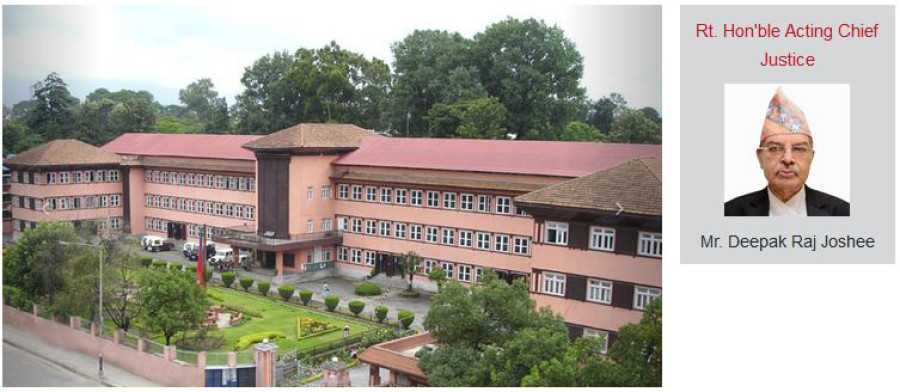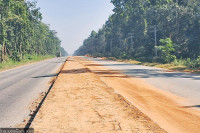National
Joshee takes over as Parajuli quits
After his attempts to remain at the helm of the Supreme Court failed, Chief Justice Gopal Prasad Parajuli, who was removed from his position by the Judicial Council Secretariat on Wednesday, tendered his resignation to President Bidya Devi Bhandari on Thursday.
Kamal Dev Bhattarai
After his attempts to remain at the helm of the Supreme Court failed, Chief Justice Gopal Prasad Parajuli, who was removed from his position by the Judicial Council Secretariat on Wednesday, tendered his resignation to President Bidya Devi Bhandari on Thursday.
When the secretariat terminated him citing documents that showed he had attained the retirement age of 65 on August 5 last year, Parajuli had tried unsuccessfully to stay put. On Wednesday evening, Parajuli met with Prime Minister KP Sharma Oli to seek his support for his continued tenure but the PM is reported to have told him to accept the JC Secretariat’s decision. He also knocked on the door of President Bhandari but she urged him to accept the decision too.
Until Thursday morning, Parajuli had said that he would work as usual, terming the letter issued by the JC Secretariat as “unconstitutional”. But when he did not get support from the highest political level, he tendered his resignation to the head of state. Hari Prasad Dawadi, spokesperson for the President’s Office, confirmed Parajuli’s resignation.
Before Parajuli put in his papers, seniormost Justice SC Deepak Raj Joshee took charge as the acting chief justice. Soon after the 10am office opening time, the SC administration removed Parajuli’s name from the top position and announced on its website Joshee’s status as the acting chief justice. After the end to uncertainty, the judicial process got on track with Joshee assigning justices their benches. On Monday, Tuesday and Wednesday, eight apex court judges had boycotted the bench assigned by Parajuli, questioning the authenticity of his citizenship and academic certificates. This piled pressure on Parajuli to give a way out to the crisis facing the judiciary. SC justices had advised him to keep out of the judiciary process but Parajuli did not heed their suggestion.
Speaking to reporters after taking charge as the acting chief justice, Joshee said his priority was to make judiciary “systematic by ending mismanagement” there. “I’ll make arrangements for effective, fast and accessible justice for ordinary people,” Joshee said, blaming internal factors for the mismanagement in the judiciary. Joshee made it clear that the judiciary would stand firmly in favour of people’s rights.
“We’ll make cordial and effective relations with Nepal Bar Association because advocates and the NBA are integral part of the judiciary,” Joshee said. The SC would organise a formal farewell programme for Parajuli once Joshi is appointed the chief justice. Joshee’s elevation will take time as he has to undergo parliamentary hearing. With Parajuli’s retirement, the apex court is left with 20 judges. The President appoints the chief justice, on the recommendation of the Constitutional Council after parliamentary hearing.
Who’s Joshee
- Born on October 10, 1954
- Designated Doctor Title, the Open International University for Complementary Medicine from Sri Lanka-Nepal Branch,Master of Political Science (TU), Bachelor of Law (TU)
- Appointed Supreme Court justice in 2014
- Advocate from 1979 to 1990
- Founder secretary of the Democratic Lawyers’ Association
- Areas of interest: Legal literature, human rights




 23.38°C Kathmandu
23.38°C Kathmandu















